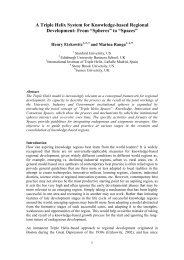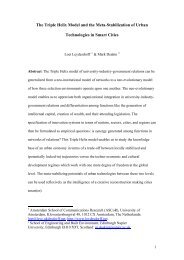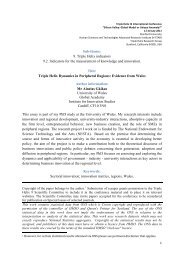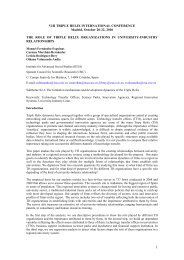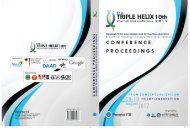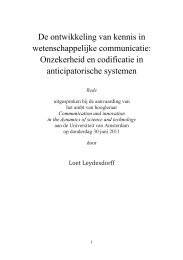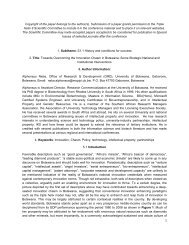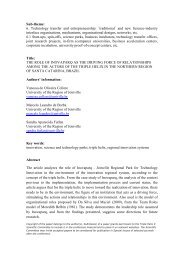TRIPLE HELIX noms.pmd
TRIPLE HELIX noms.pmd
TRIPLE HELIX noms.pmd
You also want an ePaper? Increase the reach of your titles
YUMPU automatically turns print PDFs into web optimized ePapers that Google loves.
O-018FACULTY CONSULTING: QUANTITATIVE EVIDENCE ON A TRADITIONAL GOVERNMENT-INDUSTRY-UNIVERSITY LINKAGENabil Amara, Réjean Landry, Laval University, Quebec, CanadaTheoretical background and relevance: Most studies on relationships between government, industry and universities dealwith collaborative research, research contracts, patents and university spin-off companies. Although significant, we do not knowmuch about academic consulting, which is a form of knowledge and technology transfer largely under-documented and understudied(Bercovitz and Feldman 2006; Cohen et al., 2002). Perkmann and Walsh (2008:1884) suggest that "academic consultingis perhaps practiced in different forms and for different reasons". This paper addresses this issue in differentiating threeforms of academic consulting: 1) revenue-driven consulting: consulting activities generating income opportunities; and twoforms of learning-driven consulting activities; 2) consulting activities through providing expertise or technical support, withoutbeing paid, to help companies solve technical problems; 3) consulting activities through providing expertise or technical support,without being paid, to help government agencies solve technical problems.Research questions: This paper addresses three questions: What is the extent of engagement of university researchers innatural sciences and engineering in these three forms of consulting activities with government and industry? Do academicssimultaneously engage in these three forms of consulting activities? Are there differences in the determinants of these differentforms of consulting activities?Contribution in relation to prior studies: Much of the literature on academic consulting implicitly assumes that consulting isa discretionary behaviour involving faculty motivated by personal income opportunities (Boyer and Lewis, 1984; Rebne, 1989).The evidence of the extent of such a form of academic consulting and its determinants is still scanty. Moreover, recent studies(Perkmann and Walsh, 2008) argue that unpaid academic consulting, taking the form of informal advice, is motivated by thedesire to learn about problems and challenges met by companies or government organizations. To the extent of our knowledge,there are no studies documenting the extent and determinants of informal academic consulting. This paper aims to shed newlight on the extent of these three forms of academic consulting by focusing the attention on resources and other factors that areunder the control of university researchers. It will also advance knowledge by testing some of the propositions formulated in theconceptual framework developed by Perkmann and Walsh (2008).Hypotheses: Academic consulting may involve providing expert advice, resolving technical problems or testing and validatingnew concepts. We differentiate academic consulting generating additional personal income from consulting services providedwithout being paid, referred to as informal consulting. Furthermore, we subdivide informal consulting into consulting servicesprovided to government organizations and consulting services provided to companies. Consulting services are usually providedby individual academics in response to different types of resources they have access to. We hypothesize that different types ofconsulting will be explained by the recourse to different types of resources. The conceptual framework and hypotheses developedin this paper are related to five categories of resources that are likely to influence engagement in different forms of academicconsulting: 1) financial assets; 2) organizational assets; 3) knowledge assets; 4) relational assets; 5) IP rights ownership.Methodology: This study is based on a 2007 survey of a representative sample of 2590 researchers in engineering and naturalsciences funded by the Natural Sciences and Engineering Research Council of Canada (NSERC). To test the hypothesesdeveloped in the conceptual framework, we will estimate three econometric models. First, in order to identify the determinantsof consulting activities generating additional personal income, we will estimate a poisson regression model or a negativebinomial regression model. Second, two ordered logit models will be estimated in order to identify the determinants of the othertwo forms on informal or unpaid consulting activities. The same explanatory variables will be used for all three models. Asindicated earlier, the explanatory variables are regrouped in the following six categories: 1) financial assets; 2) organizationalassets; 3) knowledge assets; 4) relational assets; 5) IP rights ownership; and 6) two control variables: academic ranks andresearch fields.Expected results and implications: The descriptive results will show that academics simultaneously engage in differentforms of consulting activities. We expect that the results of the econometric models will exhibit two patterns: some factors,such as financial resources, knowledge assets and relational (network) assets will positively explain the engagement in thethree different forms of consulting activities; likewise, we also expect that organizational assets, IP rights and research fieldswill differently influence the engagement in the different forms of consulting activities. Practical implications of the results of theeconometric models will be discussed in relation to the management of universities, and in reference to the formulation ofknowledge and technology transfer policy.Madrid, October 20, 21 & 22 - 201013



